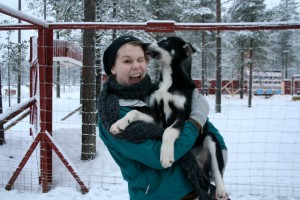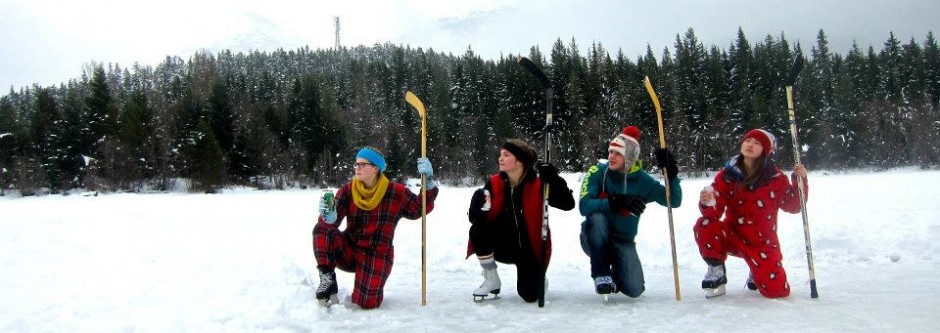Hello All!
My name is Charlotte, and I am a … third year student? The reason for the confusion is that I am actually in my fifth year at UBC, but due to a degree change I was bumped back just a tad. I started as a Physics major, but realizing that I needed more Humanities and less Math in my life, I switched to Interdisciplinary Studies, with a primary in Literature, and a secondary in Physics.
I am a fifth generation Canadian. My mother’s ancestors were born in a small Mennonite village in Manitoba, so spoke only German until they went to school. My father’s grandfather came to Vancouver from England as a cabin boy when he was just 12 years old. I was also born and raised on the University Endowment Lands, with all of my schooling – from pre-k to university – on UBC. So, I have led a very sheltered life. It wasn’t until two years ago, when I did a year abroad in Sweden at Lunds Universitet, that I had the opportunity to explore what was outside of Vancouver and fall in love with other cultures. It also made me realize how proud I was to call myself a Canadian, despite not knowing a great deal about my country.

Studying hard during my study abroad year in Sweden. This was taken in Lapland, in the northern part of Finland.
I was asked during a Swedish Literature class at Lund what Canadian literature we are taught as students. I honestly could not name anything beyond Margaret Atwood and Anne of Green Gables; neither of which I had actually read. While I still hold some very Canadian stereotypes (I once apologized to a coat rack after bumping into it), I realized that I wanted to learn more about what shaped our culture. Specifically how who we are as Canadians is presented in a literary context. This course sounds perfect, bringing literature back to basics, and analyzing why certain works survived over others.
The blogging format is new to me in an educational setting, so I am looking forward to seeing how it will work. I expect to gain a lot from this course, beyond rote memorization of literary works. I am also fairly computer illiterate, but I hope that my skills will improve quickly as the term progresses.
Works Cited
“History”. City of Steinbach. Network Media, 2015. Web. 7 Jan. 2015. <http://www.cityofsteinbach.info/>.
Lund University. 19 Sept. 2014. Web. 8 Jan. 2015. <http://www.lunduniversity.lu.se/>

Hi Charlotte, very nice to meet you, I am looking forward to your contributions to our course of studies. Thank you for a great beginning, and I hope you will come to enjoy the art of blogging – over writing essays! Thanks again. Erika
Hi Charlotte!
Great to meet you and I enjoyed your blog post. I remember travelling alone for the first time – both terrifying and invigorating! I’m sure Iceland will forever be a place with warm memories and where you felt growing pains. As an English Lit student, just wanted to fill you in on some pretty awesome Canadian writers: Douglas Coupland (from Vancouver, even!), Gabrielle Roy (Frano-Manitoban), Tomson Highway (also from Manitoba) and of course Alice Munro (from Ontario)! I’ve also never blogged for a class before; hopefully we catch on quickly 🙂
Caitlin
Thanks Caitlin! I was directed towards Alice Munro by international students who had a better background than I in Canadian literature, and I love her work. I’ll definitely check out the other authors. Thanks for the tip! 🙂
Hey Charlotte!
Nice to meet you, I enjoyed your brief recount of your heritage, it seems you are a true “Vancouverite”. I was raised between Vancouver and the UK, spending too much time on airplanes yet this made me appreciate Vancouver’s natural beauty and polite people a lot more! As well, I have not read a plethora of Canadian literature, even in high school (here in Vancouver) we were not taught many works by Canadian authors. I think this lack of exposure to Canadian literature in grade schools is defiantly a problem, one that has continued and even become worse today. I think that literature has an important role in shaping our culture, including topics of accurate historical accounts of Canadian ‘moments’.
I am also computer illiterate, so don’t worry, you’re not alone! I look forward to reading more of your blogs during this semester.
Hey Leana!
It’s nice to meet you. I do feel very “Vancouverite”, but less so now than I did before I travelled. I realized that the heart can feel at home in many different cities across the globe. I agree with you that the Canadian education system currently lacks in bringing Canadian literature and authors into schools. I remember a few short skits in elementary school done by members of the Musqueam band to tell some of their oral traditions and stories, however this was as far as it went when it came to Canadian literature, whether that of First Nations or colonists. Hopefully that changes in the near future. I suppose the aim of this course is to teach us that very thing: valuable ways in which we can become part of the change.
Hi Charlotte, it’s a pleasure to meet you and welcome to this class! I too am computer illiterate and I have never used a blogging site before, so I am very nervous but I hope that we both increase our blogging and computer super powers.
I really enjoyed reading your blog and I am very curious as to what made you realize that you loved Canada when you were studying abroad in Sweden? Was it your interactions with different people from different cultures? Or was it the physical geography that made you realize that you loved Canada? I ask this because I too studied abroad for a year in Florence, Italy in 2009. It was an unforgettable experience for me and it made me realize that I love Canada! Everybody that I interacted with in Italy had nothing but positive things to say about Canada (even people that have not been here yet), and it made me realize that I am really fortunate to be living in a country that other people across the world love and admire just as much as I do.
I look forward to your response,
Rajin.
Hi Rajin,
It’s a pleasure to meet you as well! I bet we will be blogging aficionados by the end of this course. It’s true that I fell back in love with Canada after travelling, but it was more of an appreciation for what I have here than the blind patriotism that felt before. We are very lucky to have certain things in our lives, that we sometimes take for granted. Health care is an obvious one, but we are also extremely lucky in terms of equal rights, open minded attitudes, a beautiful natural backyard to play in, access to education, and especially a diverse cultural makeup. Despite these qualities, I also came to understand that we are not at the top of our game in any of these. My love for Canada changed from a naive attitude that everything was perfect, to an understanding that nothing is perfect, and I need to be a part of helping Canada maintain the forward-thinking, friendly reputation we have on an international scale. I want to be proud of my country for what it is trying to achieve, not necessarily what it has done in the past.
Hey Charlotte, love the cover photo; nothing beats pond hockey with a cold one! Much like you and a few other in this course I am also computer illiterate. It’s amazing we all find ourselves in foreign territory online when adults around us insist on calling us for tech support, you think we should have learned something by now. I find it it fascinating that so many of us are constantly using the internet and yet know very little about how it works. I am excited to move further into the course and explore how the web is changing literature, and given the profound dependence we have on technology I’m sure we will find some change in the way that literature is disseminated, understood, and debated. But this leaves one question for me; if we are so dependent on technology, yet know so little about its functions, how can we be sure that we are making the best use of this tool? Hopefully with a little more blogging experience we can gain a better understanding of the connections we can achieve using alternative media sources. I look forward to hearing more from your blog!
Cheers,
Nick Thomson
Hi Nick!
Hours of shovelling to clear a decent rink just made it all the more satisfying. It is a little daunting, isn’t it? We’re given a new land to explore, and we can either find a detailed map somewhere online, or set off to make one ourselves. I’ll admit that I learned more in a shorter amount of time by browsing other students’ blogs to see what was possible than I did from reading tutorials about the site. We’re all in this together, and so far everyone seems very approachable to answer questions. It is such an interesting age we live in, where one doesn’t need to spend years hashing out a plotline and getting it approved by a publishing company before they are allowed to show the world their work. We are getting a first hand experience in writing and “publishing” works, however informal, and already shaping the way media and literature interact. I look forward to your future posts as well! (I also hate Caesars and honestly only really only eat poutine when friends from abroad are visiting).
Charlotte